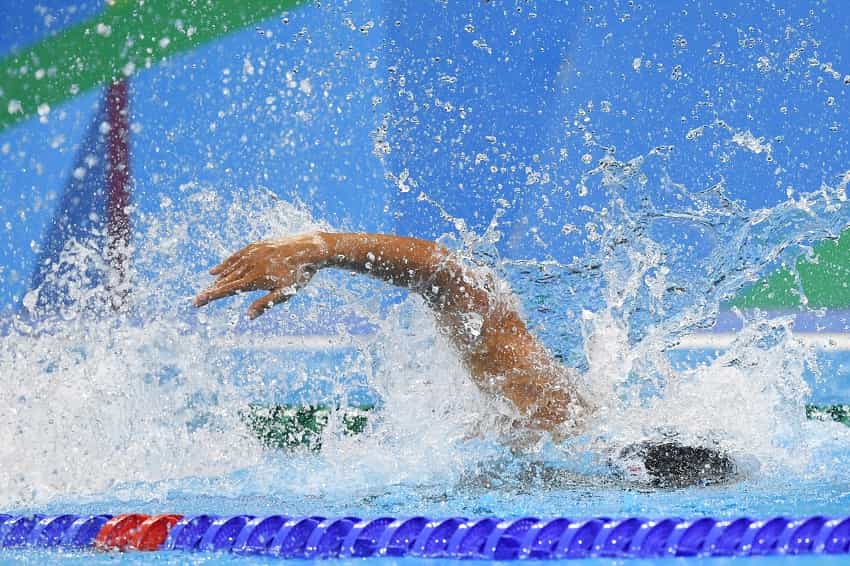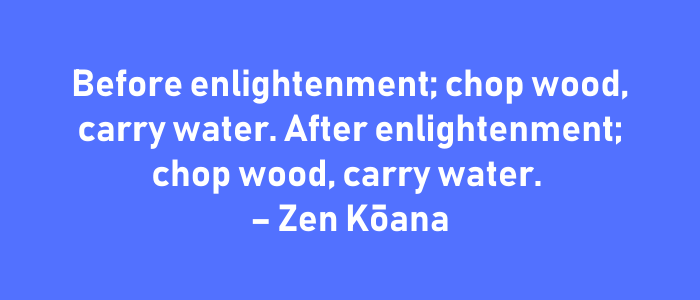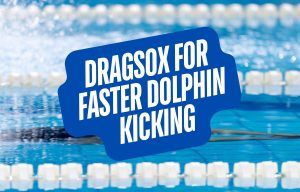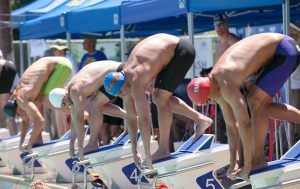Joshua Medcalf’s book, Chop Wood Carry Water: How to Fall in Love with the Process of Becoming Great is a tale of a young man learning to become a samurai.
What does that have to do with swimming?
Lots, if you pick apart the lessons that our hero, John, heeds during his journey.
A lot of the same things that I have talked about at length both on this site and in my mental training workbook for swimmers, Conquer the Pool: The Swimmer’s Ultimate Guide for a High-Performance Mindset.
Stuff like:
- Falling in love with the process of chasing excellence in the water…
- Being present with your thoughts while churning up and down the black line…
- The power of little wins, and how they are the main drivers of the big results you want…
- Developing an attitude of gratitude in and out of the water…
- And how to develop authentic self-confidence.
The book is not written in your standard self-help format. Rather, it’s a fable, with each chapter providing a lesson, along with examples from the real world (Medcalf mentions Kobe Bryant and his Mamba Mentality, for instance).
If you are looking for a paint-by-number checklist for mental toughness, you will be disappointed. The book is meant to give you the starting points for thinking about how to implement the lessons in your life and in the pool.
Below are just some of the lessons that swimmers will pull from Chop Wood Carry Water, some of my own notes and thoughts, as well as applications for swimmers.
LESSSGO.
Where to Buy — Chop Wood Carry Water: How to Fall in Love with the Process of Becoming Great
1. “Comparison is the thief of all joy.”
When the satisfaction you get is completely based on how other swimmers perform, what kind of enjoyment can you expect to get from all of your hard work?
Not much.
Comparisons are inevitable. We do it constantly—it’s a normal human behavior to rank and grade ourselves according to the people around us.
It’s how we choose what lane to swim in at practice and the order in which our lane-mates use.
I have always kept a simple rule with comparisons: If it’s motivation, use it. If it’s not, avert your focus.
There will always be someone faster. Even Michael Phelps, Katie Ledecky, and Caeleb Dressel lose races.
You can’t control what other swimmers do, but you can always control what you do. Instead of wasting your energy wanting what other swimmers have, focus on maximizing what you have.
- “The grass is greener where you water it.”
2. The power of little wins.
I talk a lot about the value of little wins. And some of you listen, but many continue to discount them because they appear inconsequential.
Going to practice today and working hard once is nice, but it doesn’t make us feel like we have made progress. This daily decision to accrue little wins takes time to reveal itself, which flies in the face of our expectations of immediate gratification and success.
Doing the small things is not difficult. But the reason we don’t do them consistently (beyond appearing not meaningful enough) is that it is super easy to not do them at all as well.
- “In the big picture, every single choice matters, no matter how small. Everything you choose to read, listen to, or look at. Everything you think about, dream about, or focus on… Inches might look small up close, but added up over the right amount of time, they can cover any distance in the universe.”
- “The problem with small is that it isn’t sexy, and it’s often boring.”
3. Focus on the process.
If I’ve said it once, I’ve said it a kajillion times.
Build a process that you believe in, and stick to it.
(Here, here, and here, for starters.)
But staying on your process is tough.
(And I am certainly not discounting adjusting your process where necessary.)
The uncertainty, the result, the big goal at the end of the tunnel—they will try to distract you from doing what you need to do today to excel.
- “Your greatest challenge… will be faithfully keeping your focus on the process, while surrendering the outcome.”
- “With one eye on the goal, you only have one eye for the journey.”
- “If you look at something as a test, then you will focus only on passing the test instead of maximizing your growth through the experience. Over time, the person who is simply focused on maximizing what they can learn and how they can grow will become much greater than the person who sees life as one continual test to prove themselves.”
4. The process defines you, not the results.
Because sport in general is so result-focused, it’s challenging not to completely wrap our identity in what we do on race day.
Instead of relying on a result or outcome to define you, the way you approach training and competition each day are what build the foundation of your identity.
Things that can’t be taken away from you because the pool gets shut down or you get injured or you retire.
Approach your process with the mindset of wanting to improve who you are, and not just what kind of swimmer you plan on being when you shave down and strap on the tech suit.
- You become the person who loves to compete, and not just a swimmer who swims fast on race day.
- You become the person who chooses to embrace discomfort, and not just a swimmer who wins a medal.
- You become the person who approaches challenges with a positive outlook, and not just a swimmer who breaks a record.
The process is what defines you. Not the result.
- “Your value comes from who you are, not from what you do. Every human being is infinitely priceless… Don’t find your value in something that can be gone in a moment’s notice.”
- “Things like winning, rebounding, sales, or beating your opponent’s records, can distract us from what is more important: the person we become on the journey.”
5. Pay now or pay later.
Discomfort is part of the deal. You are paying for it one way or the other. By not taking on the discomfort today, you are merely pushing it to the future to be experienced later.
Better to feel the discomfort today in training then tomorrow in competition.
- “Uncomfortable isn’t a choice, but where you experience it is… we can choose to experience that difficulty now, or push it off until later. Everything costs something. Nothing comes free. Hard isn’t a choice, but where you experience it is.”
Working hard is hard. Pushing yourself to the brink each day is hard. Eating like a champ every day is hard. Putting the phone away and going to bed early is hard.
But what is even harder is “failing to come close to your potential. So is the pain of regret.”
6. What kind of stories are you telling yourself?
It’s not the experiences that shape you, ultimately; it’s how you frame them in your mind.
Perpetually bagging yourself with negativity won’t help you show up eager to go to work tomorrow.
Remind yourself of your successes so that you can counter the typical tendency to dwell and obsess on the sets you didn’t do well, the races where you under-performed, and so on.
- “Your memories are not created through your experiences, rather they are created through the stories you tell yourself and others about those experiences. So, if you leave a practice or match and you tell everyone how poorly you played, and you focus on all your mistakes that is what your brain remembers. Most people undermine all the hard work they are putting in by telling really negative stories and blocking out all the growth that is happening.”
Each day challenge yourself to require your brain to recognize the things you are doing well.
The goal isn’t to generate a sense of false achievement or to pretend like things aren’t in need of repair or that things are fine and dandy.
Rather, building your own hall of fame (or writing out moments of excellence and storing them in a Confidence Jar) to use those moments of excellence that are happening and using that satisfaction to rewire our mindset into one that is hungry to chase more moments of excellence without the parking brake of a limited mindset.
- Each day, challenge yourself to “write out between fifteen and sixty-three specific things you did well.”
- “You have ignored what you have done well for a long time, while blowing your ‘flaws’ out of proportion. So, maybe for the next six months let’s try and do the reverse. Let’s ignore the ‘flaws,’ focus on finding what you did well and how you got better.”
By choosing a mindset that focuses and rewards excellence, you will feel the wind behind your back, instead of blasting against your face.
















